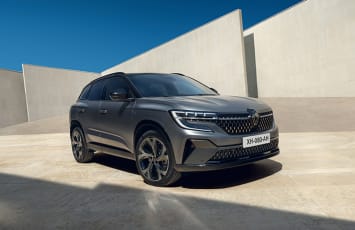
Which EV powertrain is right for you?
It’s easy to see the appeal of investing in an eco-friendly EV, but making the switch to electric power can seem complex. Renault is here to help. Read on to discover all about petrol alternatives with E-Tech 100% electric and E-Tech hybrid.
E-Tech 100% electric or E-Tech hybrid?
It’s 12 years since the introduction of the Renault Zoe E-Tech 100% electric, and Renault has now sold 34,000* EVs in the UK. With such huge expertise in the electric vehicle sector, Renault understands that moving from an internal combustion engine to 100% electric overnight is not a simple swap, which is why it developed E-Tech hybrid technology - optimising electric power for all.
Who is 100% electric for?
EVs are for drivers who want a car that produces zero exhaust emissions(1) and don’t want to refuel with petrol. Nevertheless, buying and running an EV requires a commitment to change habits and adopt a new way of motoring, and for now at least, that might not be for everyone.
Which vehicles are 100% electric?
Renault offers a broad range of EVs, from superminis to family cars and eLCVs. These include the Megane, Kangoo and Master, Scenic, as well as the upcoming Renault 5.
Who are hybrids for?
Hybrids offer a midway solution, with many of the strengths associated with EVs but retaining the familiarity and convenience of a petrol-powered car. For example, you’ll be able to pull away and drive shorter distances in all-electric mode, boosting overall efficiency whilst still having the use of a petrol engine when needed.
However, not all hybrids are the same: key differences include battery size (kWh), the power of their electric motor (kW) and whether you need to plug them in to charge. Which one is right for you will depend on factors such as how often you use your vehicle and mileage covered.
E-Tech full hybrid
This offers two energy sources to help keep you moving: the E-Tech full hybrid technology converts energy recovered during braking (kinetic energy) to self-charge a powerful battery (400V), meaning you don’t plug it in. It helps to reduce petrol consumption compared to an equivalent vehicle with just an internal combustion engine(2).
Which vehicles are full hybrid?
Renault has developed a comprehensive range of full hybrid models that includes Austral, Arkana, Clio, Captur and the upcoming Rafale.
E-Tech plug-in hybrid
The plug-in hybrid has a 9.8 kWh battery, compared with 1.2 kWh for a hybrid car. The higher capacity battery in the plug-in hybrid model can store more energy, allowing you to cover some journeys in full electric mode. To maximise efficiency, it is best to plug in whenever the battery is depleted, but it’s not essential to do so.
You can drive in full electric mode or a hybrid of petrol engine and electric motor. Electric is utilised exclusively during start-up, with the vehicle shifting to hybrid based on the driving conditions, although there is a manual switch for you to move between modes.
Ready to join the revolution?
Making the transition to 100% electric can seem a daunting prospect, which is why Renault has produced two distinct hybrid ranges to ensure that everyone can go at their own pace.
Rather than taking a generic approach to the two ranges, Renault has designed and developed these cars specifically based on their engine technologies to optimise weight, efficiency and performance - each providing its own unique benefits.
Whatever your driving style there should be an electric or hybrid Renault model to suit your needs.
*34,458 Renault electric vehicle sales in the UK between 2012-2023. Figures correct at time of publishing.
(1) The official CO2 emissions for the Renault range (electric, hybrid and petrol) are 0-133g/km. WLTP figures shown are for comparability purposes. Actual real world driving results may vary depending on factors including the starting charge of the battery, accessories fitted after registration, weather conditions, driving styles and vehicle load.
(2) WLTP mpg figures for the Renault hybrid range at 57.6-67.3mpg compared to the Renault petrol range at 47.9-54.3mpg. Real world driving results may vary.
